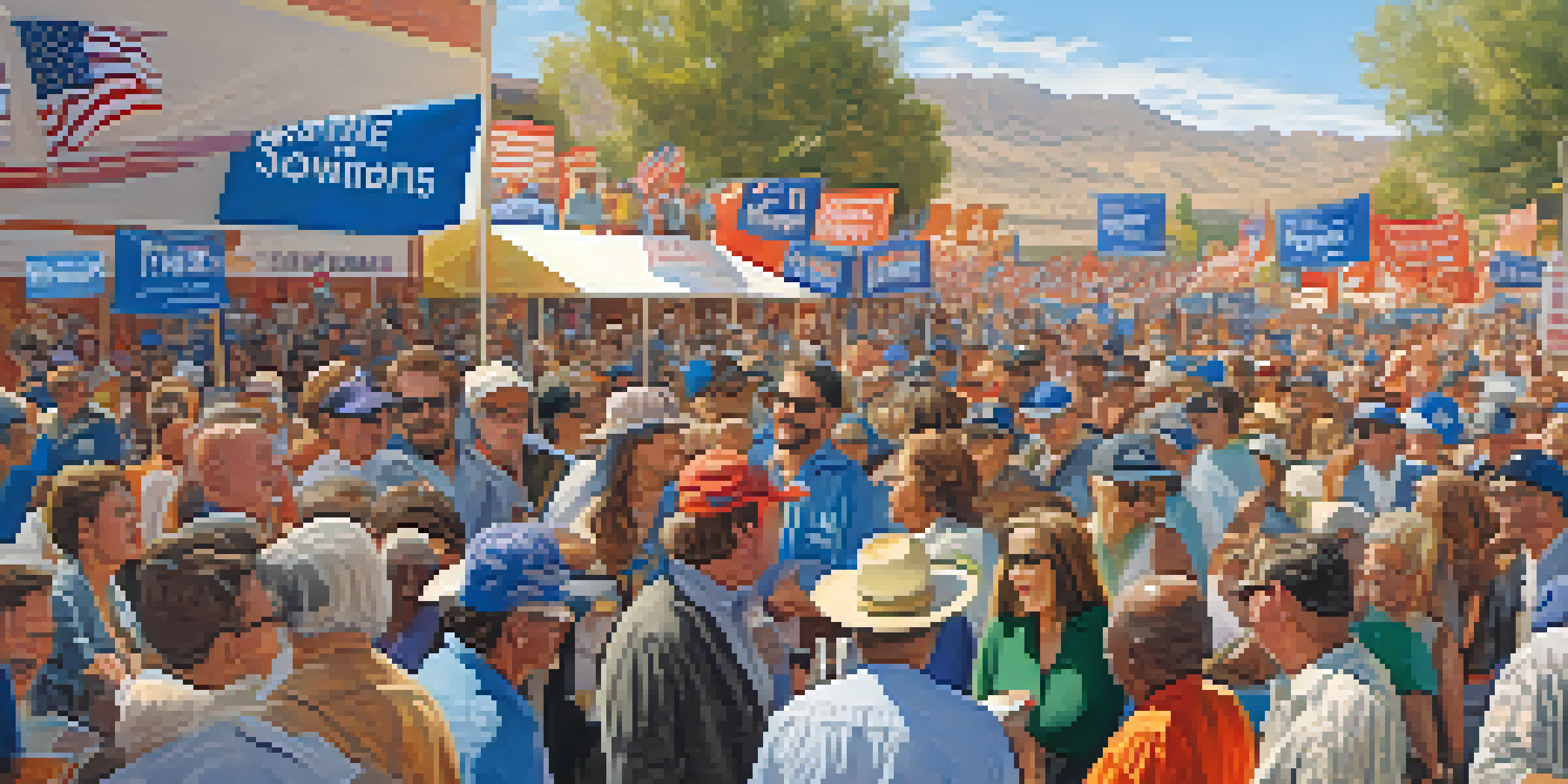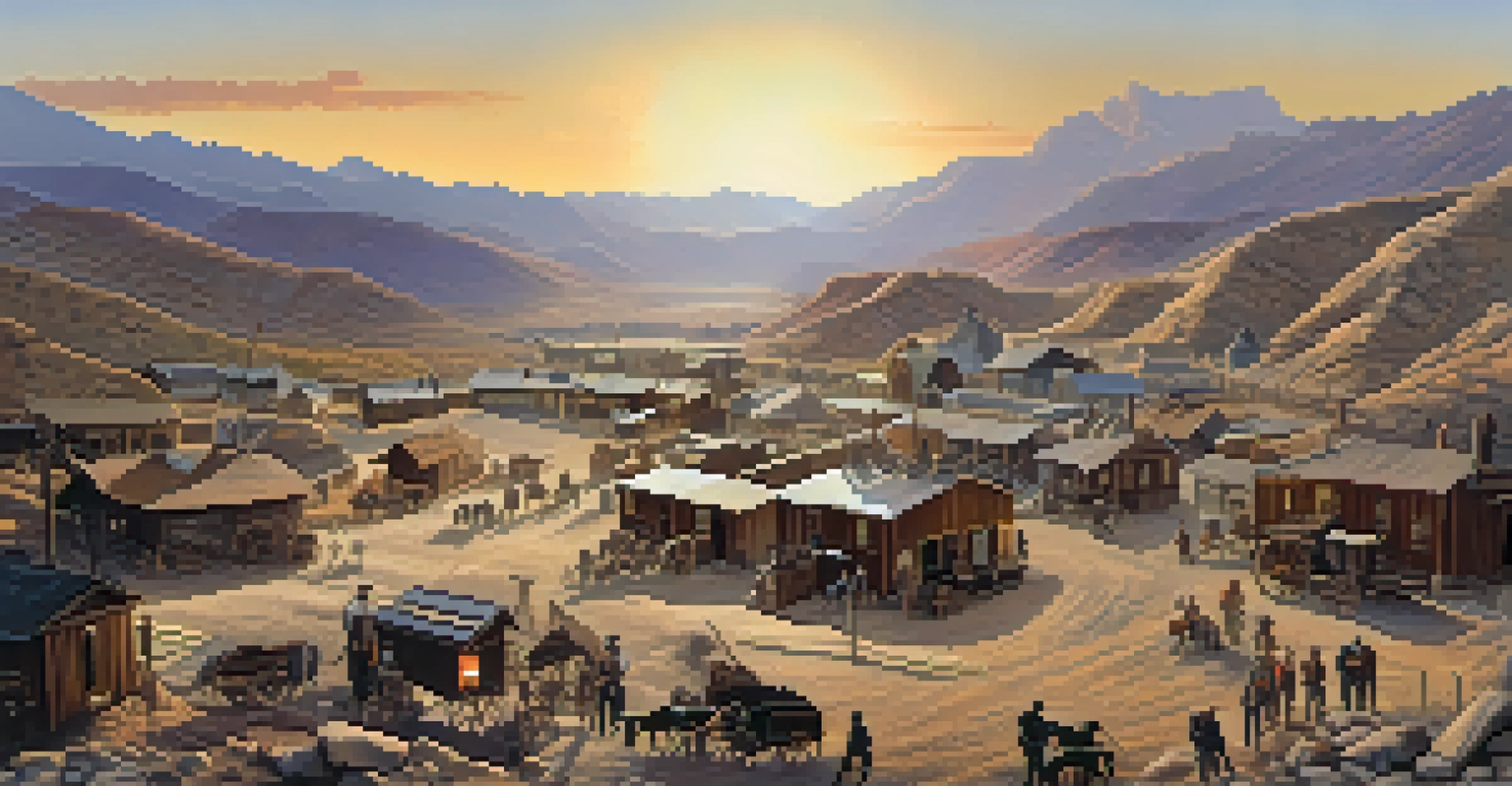Nevada's Political History: Lessons for Future Elections

Early Political Landscape: The Birth of Nevada
Nevada's political history began in the mid-19th century when it was established as a territory in 1861. The discovery of silver in the Comstock Lode transformed the region, attracting a diverse population and economic opportunities. This influx of settlers laid the groundwork for a unique political environment that blended various interests and perspectives.
The ballot initiative is a powerful tool for the people, empowering them to take control of their governance.
As Nevada achieved statehood in 1864, its political identity was deeply influenced by mining interests, which dominated the economy. This early focus on resource extraction shaped policies and political decision-making, often prioritizing the needs of miners and their communities. The state's rapid growth also fostered a culture of independence and a desire for local governance.
This foundational period set the stage for Nevada's evolving political landscape, characterized by a mix of Democratic and Republican influences. The state's distinct identity, shaped by its mining roots, continues to resonate in contemporary political discourse and highlights the importance of understanding history when considering future elections.
The Impact of the Progressive Era on Nevada Politics
In the early 20th century, the Progressive Era brought significant reforms to Nevada's political system. Activists pushed for changes aimed at curbing corruption, expanding voting rights, and increasing government accountability. This period saw the introduction of direct democracy measures, such as the initiative and referendum, allowing citizens greater control over legislation.

These reforms reflected a growing desire for transparency and citizen engagement in the political process. Nevada's unique direct democracy approach empowered voters to influence laws directly, an aspect that has defined its political culture. The impact of these changes is still evident today, as Nevadans frequently utilize ballot initiatives to shape policy outcomes.
Nevada's Political Roots in Mining
Nevada's political identity was shaped by its mining interests, which influenced early policies and decision-making post-statehood.
Understanding the Progressive Era's influence helps contextualize current political practices in Nevada. As we approach future elections, the emphasis on direct voter participation remains a lesson for other states, highlighting the importance of engaging citizens in shaping their governance.
Nevada's Role in National Politics: The 2008 Election
The 2008 presidential election marked a pivotal moment for Nevada in the national political arena. With its diverse population and crucial electoral votes, Nevada became a battleground state that played a significant role in determining the outcome. The influx of campaign resources highlighted the state's growing political importance and its shifting demographics.
In politics, nothing happens by accident. If it happens, you can bet it was planned that way.
As Nevada's population became increasingly diverse, candidates began to tailor their messages to resonate with various communities. This change underscored the need for campaigns to engage with voters on a personal level, addressing local issues and concerns. The outcome of the 2008 election showcased Nevada's potential to influence national politics significantly.
The lessons learned from this election emphasize the importance of understanding and addressing the unique demographics of Nevada. Future candidates must recognize and adapt to the state's evolving electorate to effectively connect with voters and secure their support.
The Rise of Nevada's Latino Vote: A Game Changer
In recent elections, the Latino vote in Nevada has emerged as a critical factor influencing political outcomes. With a growing population, Latinos have become a significant voting bloc, prompting candidates to focus more on issues relevant to this community. This demographic shift highlights the importance of inclusivity in political strategy.
Candidates who successfully engage Latino voters often prioritize immigration reform, education, and economic opportunities. The increased turnout among this group reflects a broader trend of civic engagement, showcasing the potential for transformative change in Nevada's political landscape. As the Latino population continues to grow, its influence on elections will only increase.
Latino Vote's Growing Impact
The increasing Latino population in Nevada has become a significant voting bloc, prompting candidates to prioritize issues that resonate with this community.
Understanding the power of the Latino vote is essential for future candidates in Nevada. By addressing the specific needs and concerns of this community, politicians can foster a more inclusive environment and enhance their chances of success in upcoming elections.
Lessons from Nevada's Recent Elections: Voter Engagement Strategies
Recent elections in Nevada have provided valuable insights into effective voter engagement strategies. High-profile races have showcased the importance of grassroots organizing and community outreach in mobilizing voters. Campaigns that prioritize personal connections and local issues often see higher turnout rates, especially among younger voters.
Innovative strategies, such as utilizing social media to reach younger audiences, have proven effective in Nevada. Candidates who embrace technology and engage with voters online can create a sense of community and foster greater participation in the electoral process. This approach also allows for real-time feedback and the ability to address concerns promptly.
As we look toward future elections, the lessons learned from recent campaigns in Nevada serve as a guide for candidates nationwide. Emphasizing authentic connections and utilizing modern tools for engagement can enhance voter turnout and create a more informed electorate.
The Importance of Local Issues in Nevada Politics
Local issues have consistently played a crucial role in shaping Nevada's political landscape. From education funding to water rights, candidates who prioritize these topics often resonate more with voters. Understanding the local context helps candidates align their platforms with the concerns of constituents, fostering trust and credibility.
In recent elections, the focus on local issues has become increasingly relevant as Nevadans express their desire for solutions that directly impact their lives. Campaigns that address pressing concerns, such as housing affordability and healthcare access, tend to mobilize voters and create a sense of urgency around election participation. This trend highlights the importance of listening to constituents and tailoring campaign messages accordingly.
Local Issues Drive Voter Engagement
Candidates focusing on local issues, such as education and healthcare, tend to connect better with voters and drive higher turnout in elections.
Candidates must recognize that addressing local issues is not just about winning votes; it’s about building lasting relationships with the community. As future elections approach, the emphasis on local concerns will remain vital for candidates seeking to connect with voters and create meaningful change in Nevada.
The Future of Nevada Politics: Emerging Trends to Watch
As we look ahead, several emerging trends are shaping the future of Nevada politics. The increasing diversity of the electorate, particularly among younger voters, suggests a shift in priorities and values. Candidates who adapt to these changes and address the concerns of new generations will likely find success in upcoming elections.
Additionally, the role of technology in campaigning continues to evolve, with data analytics playing a crucial role in understanding voter behavior. Campaigns that leverage data to tailor their messages and outreach efforts will be better positioned to engage constituents effectively. This trend emphasizes the importance of innovation in political strategy.

The future of Nevada politics will also be influenced by ongoing conversations around social justice and equity. Candidates who champion these causes and demonstrate a commitment to inclusivity will resonate with a broader audience. As we prepare for future elections, these trends highlight the need for candidates to remain agile and responsive to the changing political landscape.